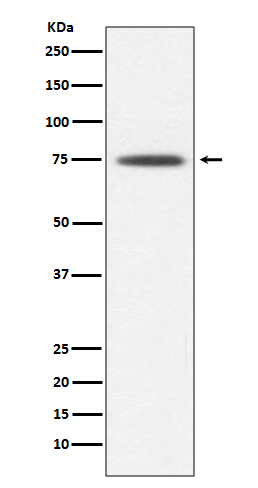
| WB | 1/500-1/1000 | Human,Mouse,Rat |
| IF | 1/20 | Human,Mouse,Rat |
| IHC | 咨询技术 | Human,Mouse,Rat |
| ICC | 技术咨询 | Human,Mouse,Rat |
| FCM | 咨询技术 | Human,Mouse,Rat |
| Elisa | 咨询技术 | Human,Mouse,Rat |
| Aliases | HSP75; HSP90L; Trap1 |
| Entrez GeneID | 10131 |
| WB Predicted band size | Calculated MW: 80 kDa; Observed MW: 75 kDa |
| Host/Isotype | Rabbit IgG |
| Antibody Type | Primary antibody |
| Storage | Store at 4°C short term. Aliquot and store at -20°C long term. Avoid freeze/thaw cycles. |
| Species Reactivity | Human |
| Immunogen | A synthesized peptide derived from human Hsp75 |
| Formulation | Purified antibody in PBS with 0.05% sodium azide. |
+ +
以下是关于Hsp75抗体的3篇代表性文献及其摘要概括:
---
1. **文献名称**: *Mitochondrial HSP75 interacts with and regulates stress-activated mitogen-activated protein kinases*
**作者**: Meriin AB et al.
**摘要**: 该研究揭示了线粒体Hsp75(HSPA9/GRP75)通过结合并调控JNK和p38 MAPK信号通路,参与细胞应激响应。研究使用特异性Hsp75抗体进行免疫共沉淀和Western blot分析,证实其在氧化应激中维持线粒体稳态的作用。
---
2. **文献名称**: *GRP75 overexpression promotes cancer cell proliferation and metastasis in triple-negative breast cancer*
**作者**: Wadhwa R et al.
**摘要**: 本文发现GRP75(Hsp75)在三阴性乳腺癌中高表达,通过抗体的免疫组化及基因沉默实验,证明其通过调控线粒体能量代谢和EMT通路促进肿瘤侵袭转移,提示其作为潜在治疗靶点。
---
3. **文献名称**: *Hsp75 interacts with the mitochondrial reactive oxygen species scavenging system in Parkinson’s disease models*
**作者**: Burbulla LF et al.
**摘要**: 研究利用Hsp75抗体在帕金森病模型中揭示Hsp75与线粒体抗氧化酶(如SOD2)的相互作用,发现其功能失调导致多巴胺能神经元变性,为神经退行性疾病的机制提供了新见解。
---
**备注**:若需获取全文,建议通过PubMed或ResearchGate搜索标题,或联系作者获取预印本。部分文献可能需订阅访问权限。
Hsp75. also known as GRP75 or HSPA9. is a member of the heat shock protein 70 (HSP70) family localized primarily in mitochondria. It plays critical roles in mitochondrial protein import, folding, and stress response. As a chaperone, Hsp75 facilitates the assembly of mitochondrial protein complexes, supports the structural integrity of the TIM/TOM translocase systems, and aids in the transport of nuclear-encoded proteins into mitochondria. It is also implicated in regulating apoptosis, oxidative stress responses, and metabolic pathways. Dysregulation of Hsp75 has been linked to neurodegenerative diseases (e.g., Parkinson's and Alzheimer's), cancer progression, and metabolic disorders, highlighting its importance in cellular homeostasis.
Hsp75 antibodies are essential tools for studying its expression, localization, and functional mechanisms. They are widely used in techniques like Western blotting, immunohistochemistry, and immunofluorescence to detect Hsp75 levels in tissues or cultured cells under physiological or pathological conditions. In cancer research, these antibodies help investigate Hsp75's role in tumor survival, metastasis, and chemoresistance, as it is often overexpressed in malignancies to counteract proteotoxic stress. Additionally, Hsp75 antibodies are employed in drug discovery to evaluate therapeutic agents targeting mitochondrial chaperone systems. Their specificity and reliability make them valuable for both basic research and clinical applications.
×